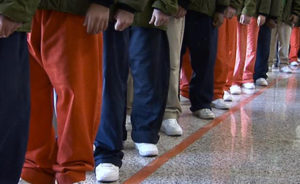Full Senate approves FY26 budget with key county funding boosts
 The Michigan Senate advanced its budget proposals this week, including notable increases in funding for county governments and crime prevention, plus potential reimbursements related to recent court decisions on tax foreclosures.
The Michigan Senate advanced its budget proposals this week, including notable increases in funding for county governments and crime prevention, plus potential reimbursements related to recent court decisions on tax foreclosures.
Tucked into the general government budget is a $29 million increase in county revenue sharing, a move that has drawn praise from MAC, which has long advocated for stronger state support for basic county operations.
In addition to that boost, $60 million has been allocated for county-level crime prevention programs, part of a broader bipartisan effort to tackle rising public safety concerns. The investment aims to strengthen community-based responses and law enforcement partnerships across the state.
Perhaps the most politically significant development, though, came with the addition of a $100 placeholder in the Senate’s budget — a symbolic but strategic move that opens the door for an appropriation to reimburse counties for financial losses tied to retroactive foreclosure costs. These losses stem from recent court rulings that require local governments to compensate property owners who were not entitled to the excess proceeds when their property was foreclosed upon. Counties are now on the hook for these dollars even though state law was previously structured in a way that allowed counties to utilize these funds.
The placeholder introduced on the Senate floor, championed by Sen. Jonathan Lindsey (R-Branch) and Sen. John Cherry (D-Genesee), signals bipartisan recognition of the issue’s importance. Though no final decision has been made, the placeholder suggests ongoing legislative negotiations and a clear willingness from the Senate to consider covering at least part of the estimated $83 million in statewide costs counties may face from retroactive claims.
For more information on MAC’s budget advocacy, contact Deena Bosworth at bosworth@micounties.org.
Revenue conference trims back forecast for state’s FY26 resources
 Economic experts in the executive and legislative branches now project $15.11 billion for use in Michigan’s General Fund (GF) for fiscal 2026 after a key meeting on Friday.
Economic experts in the executive and legislative branches now project $15.11 billion for use in Michigan’s General Fund (GF) for fiscal 2026 after a key meeting on Friday.
The Consensus Revenue Estimating Conference, which is held in January and May each year, reviewed analyses of the effects of tariffs, inflation and job trends on the collection of state taxes. Experts from the University of Michigan, for example, noted that jobless rates are rising, labor demand is dipping and tariffs are expected to cut into domestic vehicle production.
After the presentations, the panel then voted to set a $15.11 billion GF figure, down $370 million from their January 2025 estimate.
“Despite the downturn in GF projections, we remain hopeful legislators will see the value of properly supporting the critical local services that our county members provide to the public,” said Deena Bosworth, MAC’s director of governmental affairs.
Legislators will use this estimate to construct the FY26 budget, which would take effect on Oct. 1, 2025.
For more information on MAC’s budget advocacy, contact Deena Bosworth at bosworth@micounties.org.
MAC urges governor to protect local control on mental health
 The Michigan Association of Counties formally voiced strong concerns to Gov. Gretchen Whitmer this week about a proposal from the Michigan Department of Health and Human Services (MDHHS) to bid out contracts for the state’s Prepaid Inpatient Health Plans (PIHPs). In the letter, MAC warned this change would effectively privatize the management of Michigan’s public mental health system — shifting oversight from locally governed, county-based entities to private, for-profit or nonprofit health plans.
The Michigan Association of Counties formally voiced strong concerns to Gov. Gretchen Whitmer this week about a proposal from the Michigan Department of Health and Human Services (MDHHS) to bid out contracts for the state’s Prepaid Inpatient Health Plans (PIHPs). In the letter, MAC warned this change would effectively privatize the management of Michigan’s public mental health system — shifting oversight from locally governed, county-based entities to private, for-profit or nonprofit health plans.
MAC emphasized that counties have played a key role in shaping and overseeing the PIHP system since 1997, ensuring services are responsive to the unique needs of local communities. The proposed shift could erode that local control, reduce transparency and result in decisions driven more by profit than by the well-being of individuals with mental illnesses, developmental disabilities and substance use disorders.
The financial impact is also troubling. The current public system operates with just 2 percent overhead, while private plans average around 15 percent. That difference could mean more than $500 million diverted annually from care to administrative costs.
MAC is urging the governor to stop the procurement process and instead work with counties and other partners on reforms that strengthen — rather than replace — the public mental health system.
For more information on this issue, contact Jimmy Johnson at johnson@micounties.org.
Podcast 83 looks at county services for Michigan’s veterans
How county offices assist Michigan’s approximately 600,000 veterans is the topic of a special episode of Podcast 83 this week.
Host Stephan Currie talks with Michael Roof of Grand Traverse County, president of the Michigan Association of County Veteran Counselors (MACVC) on what he and his colleagues do each day.
“Out of the 83 counties, there’s 79 counties that have a county department of veterans affairs. Some of us are general fund funded, and some are millage funded,” Roof said.
“Within those 79 counties, our duty is to help veterans and their dependents get and apply for any VA state or local benefits. That’s the basic bottom line,” Roof added. “That means VA benefits, widow benefits, financial assistance, burial assistance. We help them anytime they come to our office.”
“Just to be clear,” Currie responded, “there’s the Department of Military and Veterans Affairs at the state and you’re separate from them, right?”
“Yes … those are state agencies that are tasked with basically being a referral source, of getting it out and contacting veterans,” Roof said.
“So, what is most common when a veteran comes into your office, what do you guys typically find that they need most?” Currie asked.
“Assistance and filing for disability benefits or financial assistance … When someone comes in, they have to prove that they’re a veteran, first and foremost, with documentation. They must prove they are a resident of the county. And then we usually have them provide a paycheck stub for everybody in the household, two months of bank statements to show that they don’t have an excessive amount of money to, you know, contribute to the emergency situation. And then we just kind of go through their expenses and have a conversation to find out what caused this situation and how we can help.”
To learn more, click here or on the image above for the full episode, originally taped in late April.
Michigan Supreme Court bars mandatory life without parole for people under 21
 The Michigan Supreme Court (MSC) has found mandatory sentencing to life without parole for 19- and 20-year-olds to be unconstitutional. The April 2025 ruling will apply retroactively to individuals currently serving these sentences in Michigan and will allow them an opportunity for resentencing.
The Michigan Supreme Court (MSC) has found mandatory sentencing to life without parole for 19- and 20-year-olds to be unconstitutional. The April 2025 ruling will apply retroactively to individuals currently serving these sentences in Michigan and will allow them an opportunity for resentencing.
In 2022, MSC ruled mandatory life without parole sentences for 18-year-olds violated the Michigan Constitution. On April 1, 2025, that ruling was extended retroactively, under People v. Poole. Under People v. Taylor and People v. Czarnecki, MSC ruled that the same would apply to 19- and 20-year-olds under the Michigan Constitution.
To support prosecutor offices in the resentencing of approximately 580 eligible individuals across the state, MAC is requesting $10 million from the state of Michigan to be distributed to county prosecutor offices on a caseload basis.
For more information on this issue, contact Samantha Gibson at gibson@micounties.org.
New sample documents released to guide use of opioid settlement funds
 Counties now have two new resources to support the transparent and effective use of opioid settlement funds. The Michigan Association of Counties (MAC) has released sample process documents designed to help local governments manage and distribute these critical funds. The Opioid Settlement Sample Request for Proposal (RFP) Process and the Opioid Settlement Sample Emerging Needs Funds Process offer clear, practical guidance to streamline implementation and ensure accountability in addressing the opioid crisis.
Counties now have two new resources to support the transparent and effective use of opioid settlement funds. The Michigan Association of Counties (MAC) has released sample process documents designed to help local governments manage and distribute these critical funds. The Opioid Settlement Sample Request for Proposal (RFP) Process and the Opioid Settlement Sample Emerging Needs Funds Process offer clear, practical guidance to streamline implementation and ensure accountability in addressing the opioid crisis.
The RFP sample outlines a standardized process for soliciting proposals from service providers, helping counties evaluate and fund initiatives that align with evidence-based strategies. Meanwhile, the Emerging Needs Funds document provides a flexible framework for responding quickly to unanticipated or urgent needs related to substance use. Both tools are intended to promote consistency, transparency, and efficiency across counties managing these vital resources.
For additional support, contact Amy Dolinky at dolinky@micounties.org.
Counties can review, correct errors in PPT reimbursements
 The Michigan Department of Treasury (Treasury) reminds municipalities that, although not required, they can review and correct errors in Treasury’s calculation of each municipality’s millage rate eligible for the 2025 Personal Property Tax (PPT) reimbursement (MCL 123.1345(x)(ii)(B) and MCL 123.1353(5)).
The Michigan Department of Treasury (Treasury) reminds municipalities that, although not required, they can review and correct errors in Treasury’s calculation of each municipality’s millage rate eligible for the 2025 Personal Property Tax (PPT) reimbursement (MCL 123.1345(x)(ii)(B) and MCL 123.1353(5)).
The Local Community Stabilization Authority (LCSA) Act requires Treasury to make the eligible millage rate calculations available by May 1. The eligible millage rate calculations can be found on Treasury’s 2025 PPT Reimbursements website under the “Millage Rate Comparison Reports” heading. These 2025 Millage Rate Comparison Reports are intended to be used by municipalities to verify the accuracy of the eligible millage rates to be used in their 2025 PPT reimbursement calculations.
How to Review the 2025 Millage Rate Comparison Reports:
- Verify Individual Millage Rate(s) Levied in 2024
- Municipalities should compare the individual millage rate(s) levied in 2024 on the 2025 Millage Rate Comparison Reports with the millage rates reported on their 2024 Form 614 – Tax Rate Request (L-4029).
- Each millage rate reported on the 2024 Form 614 should be listed on the 2025 Millage Rate Comparison Reports (excluding special assessments).
- Verify Calculated Millage Rate Used in the Computation
- The calculated millage rates to be used in the 2025 PPT reimbursement calculations should equal the lesser of the eligible millage cap and the 2024 millage rate.
- The Millage Rate Calculation tab of the Excel workbook provides information about how each eligible millage rate is calculated.
- NOTE: Calculated eligible millage rates may be prorated and thus may not reflect the actual millage rates levied by the municipality.
When NO Millage Rate Errors Are Identified:
If a municipality does not identify an error in the 2025 Millage Rate Comparison Reports, the municipality does not need to file a form or take any further action to notify Treasury.
When Errors ARE Identified:
If a municipality does identify an error in the 2025 Millage Rate Comparison Reports, the municipality will need to complete the Form 5613 – Millage Rate Correction for the 2025 Personal Property Tax Reimbursement Calculations to notify Treasury of the error(s). In addition to the correction form, municipalities must provide substantiating documentation to support the millage correction.
The reporting forms related to the 2025 Millage Rate Comparison Reports (along with the associated deadlines) are available on Treasury’s PPT Reimbursements website under Forms and Instructions.
- Form 5608 – Portion of 2024 Essential Services Millage Rate Dedicated for the Cost of Essential Services
- Optional form to be used by counties, cities, villages, townships, and local authorities that levy an extra-voted millage rate that partially funds the cost of essential services (for example a Fire/Cemetery millage).
- NOTE: For extra-voted millage rates with a name that implies the millage was partially dedicated for the cost of essential services, Treasury has identified the millage type as “PARTIAL ESSENTIAL SERVICE” on the 2025 Millage Rate Comparison Reports.
- DUE DATE: Aug. 1, 2025
- Form 5613 – Millage Rate Correction for the 2025 Personal Property Tax Reimbursement Calculations
- Optional form to be used by municipalities that identify an error in the 2025 Millage Rate Comparison Reports.
- DUE DATE: Aug. 1, 2025
The corrections reported on Form 5613 and the essential services percentage reported on Form 5608 will be used in the calculation of the 2025 PPT reimbursements. Form 5613 and Form 5608 submissions will not be accepted after Aug. 1, 2025.
Please direct any questions regarding the PPT reimbursement calculation or correction process to TreasORTAPPT@michigan.gov or 517-335-7484. Additional information is available at www.michigan.gov/pptreimbursement.
Justice Department accepting applications for COPS grants
 A Notice of Funding Opportunity (NOFO) for the U.S. Department of Justice’s Office of Community Oriented Policing Services (COPS Office) was released on May 8, 2025. The COPS Office is providing this grant opportunity to advance public safety through community policing by funding additional full-time career law enforcement positions.
A Notice of Funding Opportunity (NOFO) for the U.S. Department of Justice’s Office of Community Oriented Policing Services (COPS Office) was released on May 8, 2025. The COPS Office is providing this grant opportunity to advance public safety through community policing by funding additional full-time career law enforcement positions.
Information regarding eligibility for the grant, application instructions, award details and more can be found HERE. The COPS Hiring Grant Program Fact Sheet includes program highlights, contact information, and deadlines.
WHEN: Deadline for first part of application in Grants.gov is June 25, 2025, at 4:59 p.m. ET. The deadline for completed application in JustGrants is July 1, 2025, at 4:59 p.m. ET. Start EARLY. This is more than a one-day process.
WHERE: 1. Register at www.grants.gov. 2. Complete the application in the JustGrants Justice Grants System.
HOW: Online only. No hard copies sent by U.S. Mail or electronic copies sent via email.
PROGRAM WEBSITE: https://cops.usdoj.gov/chp
For more information on this issue, contact Samantha Gibson at gibson@micounties.org.
 Staff picks
Staff picks
- From Crisis to Solutions: Policy Catalysts for Improved (Mental Health) Outcomes (National Association of Counties)
- Flawed federal programs maroon rural Americans in telehealth blackouts (Kaiser Health News)
- Michigan Pavement Forecast 2026-2036 (chart) (Transportation Asset Management Council)
- Self-healing asphalt could prevent potholes and save costs on vehicle repairs (ZME Science)
